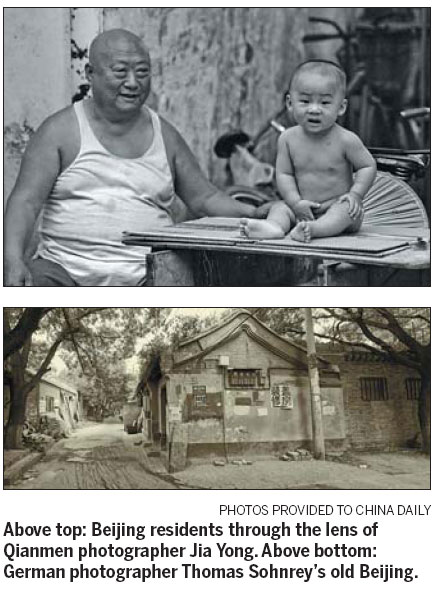
When Yana Neskodna first came to Beijing from Switzerland in 1987, there were bicycles everywhere. She hardly saw a private car, let alone a fancy sports car. Almost 20 years later, when German photographer Thomas Sohnrey first came to Beijing, he was amazed by the skyscrapers in the CBD but on later visits he realized that the zigzag hutong were what truly fascinated him.
The two did not know each other until they ran into Jia Yong, a dedicated Chinese photographer based in Dashilar, near Qianmen. And now comes an exhibition displaying the things they all share: a love for Beijing and the way they express that love: by using their cameras.
The I Love Beijing photo exhibition is a group show of about 100 works by six photographers, half from China and half overseas, including Neskodna, Sohnrey and Jia.
Jia, the main coordinator, bought about 50 old wooden doors from antique markets, mounted the photos on them and has installed them near his restaurant in Dashilar Xilu. Passers-by can enjoy these Beijing memories in what Jia described as "the most authentic Beijing atmosphere".

"We began to prepare last August," Jia told METRO. As the boss who owns two restaurants and a cafe in Qianmen, Jia fell in love with shooting photos as a teenager. He met Neskodna and Sohnrey in his eatery, and they soon decided to hold an exhibition. They invited a few other friends to join them and the current show is the result.
Sohnrey enjoys his friendship with Jia although the two cannot understand each other without a friend to act as an interpreter. But he said they communicate through their lenses. They often go out together to take pictures of Beijing, but sometimes Sohnrey goes out on his own.
"My target audience (for the exhibition) was not foreigners," he told METRO. "I want the local people to see how a foreigner sees their hometown."
Neskodna, a tour guide who has been living in Beijing since 2005, just shot what impressed her at the time. Each of her pictures is composed of two parts, or two small photos, which make a sharp and interesting comparison between the situation in the past and the present, such as the bicycles and cars.
"How time flies, and Beijing changes so fast," she said.
"Theirs are more about what they see, and ours are more about what we feel," Jia said about the differences between the Europeans' pictures and those by the three Chinese photographers. "The hutong and their stories have already been rooted in my heart."
As a Beijinger born and bred in Qianmen, Jia spent almost all his free time taking photos, especially to record the vanishing hutong. According to him, cherished scenes like old vendors selling tofu from a small cart, craftsmen making silverware, or children playing with snowballs in hutong, will rarely be seen once the hutong are gone.
"We just do the most we can," Jia said. "Through these photos, history will survive in our memories."
The exhibition closes on May 20.
China Daily

(China Daily 05/16/2011)